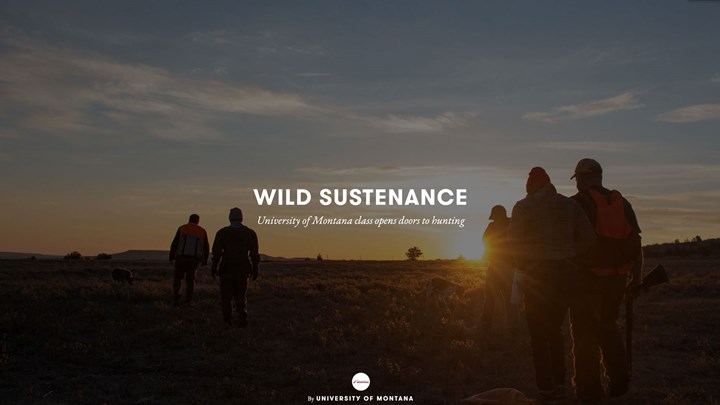
by Brian McCombie - Monday, November 27, 2023

A unique course offered by the University of Montana (UM) in Missoula called Wild Sustenance introduces college students to a hands-on education of hunting. Maybe more importantly, the course also explains the important wildlife conservation benefits of scientifically based hunting, and in doing so could aid in improving hunting’s cultural acceptance as Wild Sustenance expands its footprint outside the Big Sky State.
The only requirement to take the course? That the student be a novice hunter—at best. Many of the students come to the course with zero hunting experience.
“Almost all of us who are hunters learned from relatives and friends. We had opportunities,” said course instructor Joshua Millspaugh, UM’s Boone and Crockett Professor of Wildlife Conservation, in a UM press release. “There is such an impediment to those who didn’t have that opportunity. The students that are here say, ‘I’ve always been interested in learning more, but I don’t know where to start.’”
Now in its fifth year, the Wild Sustenance class gives them that introduction. “But what we’d ultimately like to create here is a knowledgeable citizenry that understands the role of hunting in society and in conservation,” Millspaugh explained.
The Rocky Mountain Elk Foundation (RMEF) has been a key supporter of the course since it was launched four years ago, underwriting startup costs to the tune of some $400,000.
“We greatly appreciate our partners at UM for their efforts in bringing this long-held vision to fruition,” said Kyle Weaver, RMEF president and CEO, in an RMEF press release. “This program will trigger a nationwide ripple effect allowing more Americans of all ages to learn about the very real and vital link hunting plays to conservation.”
The three-credit Wild Sustenance course features teaching modules co-branded by UM and RMEF that fulfill a unique niche through the following:
Hunting ethics are not simply presented in the coursework. These ethics and their importance are stressed throughout the course.
“We lead with ethics, because we feel strongly that is where hunting should start,” Millspaugh said. “Ethics should be a critical feature that people consider before they ever step in the field and identifying what their own individual code of ethics are and what they view as acceptable.”
According to Blake Henning, RMEF’s chief conservation officer, work on the aforementioned virtual reality modules is in progress. Using virtual reality head-mounted units, students will be able to “participate” in activities like field dressing and processing game, tracking animals and making shots under various environmental and other field conditions.
Henning attended a weekend class gathering at a local ranch where 20-plus Wild Sustenance students had practice time with firearms, including instruction in firearm safety, and then actually had the chance to hunt.
“When I was there, I discovered that many of the students were not the wildlife biology and wildlife management majors you might assume would take such a course,” said Henning. “Business majors, pre-law, really a wide assortment of students had signed up for the class.”
He added that as part of its support for the course, RMEF provides students access to a 4,000-acre RMEF ranch some 20 miles east of Missoula where students can hunt deer and elk, and practice their field craft skills.
The future of the class? Using the UM course as the template, Henning said RMEF and UM hope one day soon that Wild Sustenance will be offered in other American colleges and universities as a for-credit course. Doing so would be one more important element in expanding hunting’s cultural acceptance on a national level.
To learn more about UM’s Wild Sustenance class and view photos and videos from the weekend retreat at Teddy Roosevelt Memorial Ranch, click here. A feature film on the class is also available on YouTube.
About the Author
Brian McCombie is a field editor for the NRA’s American Hunter and writes about firearms and gear for the NRA’s Shooting Ilustrated. He is a member of the National Rifle Association and the National Shooting Sports Foundation. Brian enjoys hunting hogs, shooting 1911s, watching the Chicago Bears and relaxing with his two cats, Peanut Morgan and MikaBear.
E-mail your comments/questions about this site to:
[email protected]
Proudly supported by The NRA Foundation and Friends of NRA fundraising.
